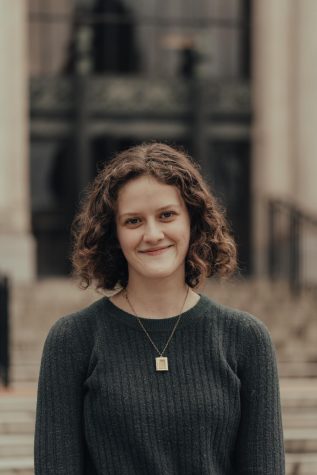Pandemic has inspired, mobilized local climate change movements
March 24, 2021
COVID-19 has generated countless obstacles to various personal and systemic goals and plans – however, in the fight against climate change, the pandemic has possibly offered inspiration and momentum.
According to Brandon Trelstad, Oregon State University’s Sustainability Officer, the university has seen improvements to the campus environment during the pandemic.
For example, there has been about 20% in utility savings during the pandemic as well as a 14% reduction in greenhouse gas emissions for the fiscal year 2020, according to Trelstad. A 20% reduction in greenhouse gas emissions is expected for the fiscal year 2021.
These savings and reductions are in large part due to decreased usage of energy within campus buildings.
“Maybe one of the very few positive outcomes of this experience is that it’s kind of been a case-study in how we can save energy in buildings,” Trelstad said.
About 6% of OSU’s emissions come from commuting, and there has been a decrease in that area as well. All of these reductions have helped OSU advance on its goal to become carbon neutral by 2025. Continuing on this path into 2021, the university has budgeted over $1 million in energy savings upgrades to buildings and is exploring options for purchasing off site renewable energy.
On a more anecdotal level, Trelstad said that the pandemic can serve as a lesson for future efforts in the fight against climate change. According to him, COVID-19 and climate change are not all that different, except in terms of timespan.
“The pandemic shows what we can do as a society in terms of responding to an existential crisis,” Trelstad said.
Jeff Bethel, associate professor of epidemiology and co-director of the TRACE project, agreed that the pandemic and climate crisis are strikingly similar, especially when it comes to the inequalities they highlight.
“Just like climate change, COVID has highlighted the fact that people with underlying health conditions, people of color and […] the poor are being disproportionately impacted,” Bethel said.
Bethel also noted that though emissions may be declining in the short-term due to COVID-19 restrictions, what matters more is how countries will rebound economically and politically in the long-term. Post-pandemic action will be important because it will impact how well countries hit Paris Agreement milestones.
COVID-19 and climate change are also similar, Bethel said, because they underscore the lack of respect for science in the U.S. There is large overlap between the two issues, in that citizens have difficulty trusting scientists and their research on both topics.
Bethel emphasized that it’s important for governments, institutions and the general public to build on the momentum from the pandemic to benefit climate change movements.
Community member Margaux Masson-Forsythe and OSU student Carly Werdel are both a part of the local Corvallis chapter of the youth climate justice Sunrise Movement and can attest to some of the silver linnings of the pandemic.
Sunrise Corvallis felt the initial effects of the pandemic when it had to cancel a big climate strike planned for Earth Day last April due to COVID-19 gathering restrictions.
“A lot of that momentum was initially lost, but since then we’ve really been focusing on restructuring our organization and putting our focus into different things,” Werdel said.
For example, Sunrise Corvallis is now prioritizing addressing inequities as part of their movement.
“I believe that the pandemic and the racial justice protests [last] summer really forced people within the environmental movement to see what has been happening for a lot of years, and it has increased our emphasis on intersectionality,” Werdel said.
Masson-Forsythe, who joined the organization during the pandemic, said she has witnessed Sunrise Corvallis growing. She also feels like COVID-19 and its stay at home guidelines allowed for more people to learn about the climate crisis in their free time.
“The hub is growing and getting stronger and stronger and so much more organized, and we have more people coming because interest is growing, and people are educating themselves,” Masson-Forsythe said.
Werdel and Masson-Forsythe also agreed that interest in joining the fight against climate change has increased during the pandemic. Part of this, according to Werdel, is that climate justice organizations have become more accessible because of functions like Zoom, which allow for more frequent meetings and for people to join even when far away.
Additionally, Werdel said, “I think the interest has increased because it’s so much more obvious how the pandemic and climate change and racial justice are really inter-related.”
Trelstad, Bethel, Masson-Forsythe and Werdel all said there are ways for people to fight climate change even during these uncertain times.
Small, everyday habits and individual changes are some ways people can aim to make a positive impact. As one example, Trelstad recommended supporting local food sources but being wary of disposable food containers when eating out.
Bethel said, “On a personal or a household level, I think people need to really think about their ability to reduce their emissions, be it walk more, bike more and when it’s appropriate, take public transportation.”
Masson-Forsythe encouraged curiosity and education, and Werdel noted that while individual changes are important, it is not the only path.
“At the end of the day, we really need some more systemic solutions that can help bring everybody into the conversation,” Werdel said.
For now, despite the challenges it brings, the pandemic may be in some ways beneficial to the climate itself and the movements associated with saving it.
Trelstad said, “[The pandemic] is a case-study in what we can accomplish to reduce emissions and we know now that we can make these emissions reductions permanent in part, and without negatively impacting people.”
























































































































